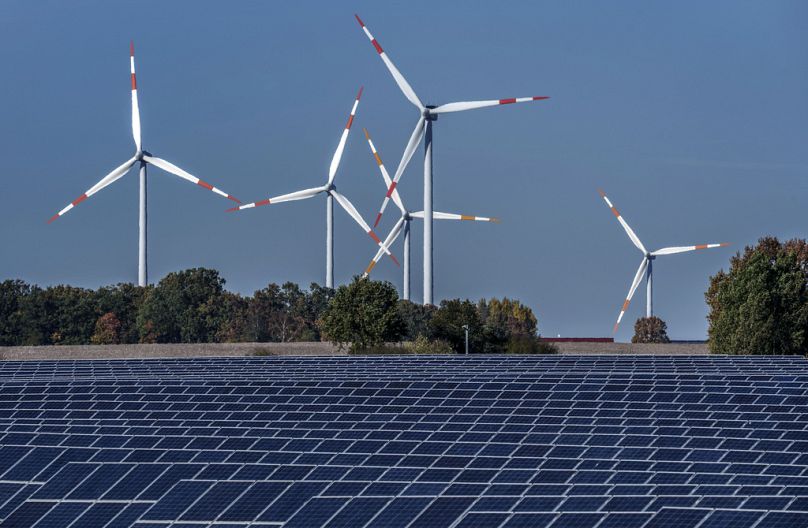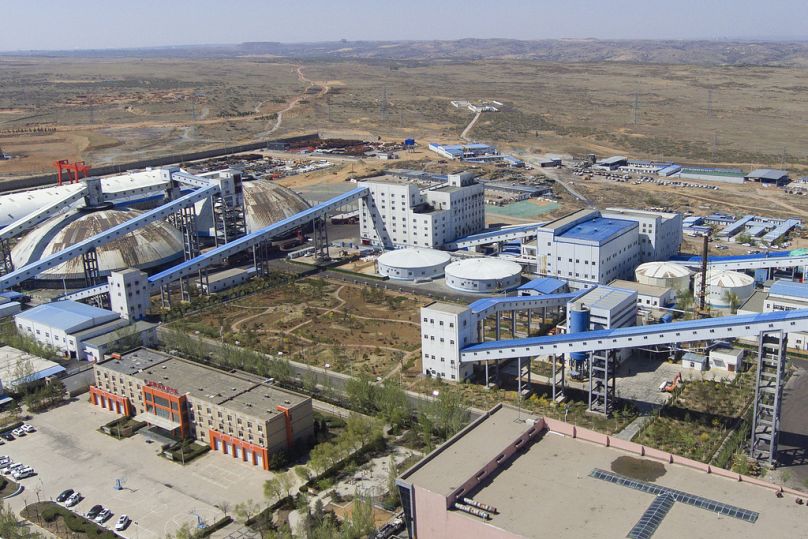The revival of Europe's domestic mining sector could reduce the continent's dependence on Chinese rare earth minerals, as well as risks such as price volatility and loss of competitiveness.
Europe's mining sector has been on the decline for several decades now, due to a variety of factors: At the beginning of the last century, Europe accounted for about 40% of global mining output. Now, that's down to 3%.
 ADVERTISEMENT
ADVERTISEMENT
 ADVERTISEMENT
ADVERTISEMENT
China's growing dominance of the battery and rare earth minerals production and supply chain has been an ongoing threat to Europe, as it significantly contributes to China's electric vehicle sector and makes the continent, and indeed other parts of the world, heavily dependent upon China for these metals and minerals.
Russia's full-scale invasion of Ukraine, which prompted a whole raft of EU sanctions on Russian oil and gas, made policymakers realise just how dependent the EU has been on Moscow for energy and sent them scrambling to find more diverse suppliers.
As such, the European Commission is now hoping to avoid a similar situation with lithium and other rare earth minerals, which are vital for the green transition. Reviving the European mining sector, therefore, has now become more important than ever.
As European Commission President Ursula von der Leyen said while announcing the European Critical Raw Materials Act during her 2022 State of the Union speech: "Never before has this parliament debated the state of our union with war raging on European soil.
"Lithium and rare earths will soon be more important than oil and gas. Our demand for rare earths alone will increase fivefold by 2030," she said. "We must avoid becoming dependent again, as we did with oil and gas."
The Critical Raw Materials Act targets 30 raw materials that the European Union has classified as critical because of their supply risk and economic importance.
Why has Europe's mining sector declined over the years?
Europe's mining sector has slumped in the past few decades primarily due to a decrease in coal mining, especially when the continent started moving towards more sustainable sources of energy. Poland, Germany, Ukraine and the Czech Republic have traditionally been some of the highest coal producers in Europe.
However, since 2012, coal power generation in the EU has dropped by about a third, leading to the closure of several power plants and coal mines that are no longer needed.
The EU in 2022 produced about 55 million tonnes of hard coal, which was a plunge of 80% compared to 1990 levels, according to the European Commission.
With the advancement of the green transition, more EU investment has also been diverted towards green projects and infrastructure, such as wind turbines, solar panels and more. On the other hand, fossil fuel investment, both by the government and by private companies, has reduced drastically.
The COVID-19 pandemic and Russia's war in Ukraine also sparked a worsening energy crisis in Europe. It caused several smelters to close down, negatively impacting energy-intensive metals such as aluminium and steel. In turn, this also led to less bauxite mining and alumina production in Europe.
According to the International Aluminium Institute, Europe, including Russia, produced about 6.50 million tonnes of alumina in 2023, which was about 20.92% down from 2022's 8.22 million tonnes.
Furthermore, Europe has considerable red-tapism regarding mining licences and approvals: it can take well over a decade to receive a mining permit.
This is several times longer than countries such as China, which can also discourage mining companies from relocating to Europe or increasing their investments in the continent's mining sector.
Additionally, Europe has very strict environmental and conservation laws, with locals protesting strongly over new mines or the expansion of existing ones. Since several critical metal and mineral deposits also happen to be near conservation or ecologically sensitive areas, governments have to proceed with caution when it comes to new mines.
This has been more difficult since Europe decided to keep its net zero 2030 goals front and centre in recent years: it has become increasingly tricky to justify approving new mines or continuing support for existing ones.
"Especially in light of the climate crisis and the high rate of biodiversity loss, the priority cannot simply be: more mining, more mining," said Michael Reckordt, section head for raw materials at the NGO PowerShift, according to Politico.
How can Europe boost mining?
The Critical Raw Materials Act is one of the more decisive pieces of legislation that Europe has rolled out for domestic mining and the production of rare earth minerals in the past few years.
Essentially, it seeks to significantly reduce red tape and increase innovation and the exploration of alternative materials.
This will mainly include clearer and more stable frameworks for recycling and mining projects, as well as more rapid and straightforward authorisation channels. Economic incentives and more support for small and medium enterprises (SMEs) are also likely to be announced.
The act sets ambitious recycling targets and aims to cut down on waste from the start. By doing so, it hopes to lessen the demand for new mines.
One such recycling project is the EU-funded Susmagpro project, which took place last year and focused on the recycling of rare-earth magnets mainly used in wind turbines, electronics and electric car motors.
The European Commission said that the aim of the project "is to develop a recycling supply chain for rare earth magnets in the EU and to demonstrate these new materials on a pilot scale within a range of application sectors. The EU imports far more neodymium-iron-boron magnets than it manufactures."
Additionally, the continent will work towards establishing strategic partnerships with third countries. Not only can this lead to significant foreign investment in Europe’s mining sector, but can also increase knowledge sharing and attract highly talented and skilled foreign labour.
"This legislation is an industrial policy blueprint for a secure and sustainable supply of raw materials in Europe," said Renew MEP Nicola Beer about the act.
"With targeted economic incentives, we are creating project-planning certainty for private investors - through single points of contact for companies and fast and simple authorisation procedures with clear deadlines for national authorities," she said. "This will boost mining, processing and recycling in Europe."
More sustainable mining policies are also likely to come in, especially due to protests in countries such as Serbia, Spain, Sweden and Germany.
Regarding the impact of mining projects on the environment, Julia Klinger, an assistant geography professor at the University of Delaware, as reported by Politico said: "I think we have to be looking much more squarely at the longer-term impacts."
"If we don't actually take proper care at the outset, then this idea of Europe becoming a climate-neutral continent through provisioning its own critical raw materials is sort of doomed from the outset," she said.
However, to achieve its climate goals and lessen reliance on other countries like China, Europe might need to ramp up mining to tap into its own rare earth mineral reserves.
Dangers of depending on foreign metal and mineral supply
In 1987, the then-Chinese leader Deng Xiaoping said: "The Middle East has oil, China has rare earths."
This statement has proved rather apt, with China currently being the global leader in rare earth mineral production, accounting for about 60% of worldwide production.
"At this very moment, if we would produce rare earths in the EU, they would have to go through China (or at least Asia) for some transformation steps into a magnet," said Stephane Bourg, director at the French Geological Survey according to Investigate Europe.
"There are zero plants in the EU transforming rare earth oxide into rare earth metal, which is a very crucial step, even if such projects are in the pipe," he said. "If I today dump 10,000 tonnes of neodymium oxide in your garden, you won’t know what to do with it."
This increased European dependence on China for critical minerals has left the continent open to significant risks such as price volatility, supply blockages, as well as the loss of competitiveness.
Furthermore, China can also use its dominance in the rare earth minerals supply chain as a geopolitical negotiation or retaliation tool. One example of this was in 2010 when China banned the export of rare earth minerals to Japan for about two months due to a fishing disagreement.
EU-China tensions have also slowly been on the rise in the past few months, due to a variety of reasons. These include China’s continued support of Russia in its war against Ukraine, as well as its aggression regarding Taiwan.
Additionally, the EU's investigations regarding Chinese electric vehicles imported into the continent, as well as concerns about data transparency and market access, are likely to make things worse.
If this situation deteriorates, it may be more difficult for Europe to access its rare earth minerals from China down the line. So now is possibly the best time to ramp up domestic supply.













